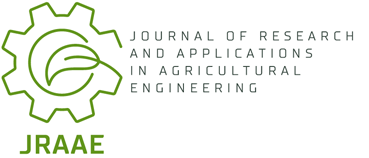Current issue
Online First
Archive
Instructions for Authors
Guide for Authors
Peer Review Policy
Research Ethics Policy
Crossmark Policy
Ghostwriting and Guest Authorship
Copyright
Open Access Policy
Plagiarism
About the Journal
Aim and Scope
Scientific Board
Publisher
Editorial Board
Indexing in Databases
Personal Data Protection
Repository Policy
Contact
ORIGINAL PAPER
Evaluation of the ecological awareness among the organic and conventional farmers in Podlaskie Voivodeship, Poland
1
SGGW, Dpt. Of Functional, Organic Food and Commodities, Faculty of Human Nutrition and Consumer Sciences, ul. Nowoursynowska 159 c, 02-787 Warszawa, Poland
Journal of Research and Applications in Agricultural Engineering 2015;60(3):82-88
KEYWORDS
ABSTRACT
The purpose of this study was to evaluate and compare the environmental awareness of the organic and conventional farmers
on the territory of the Podlaskie voivodeship. The results indicate that farmers engaged in conventional farming have
lower environmental awareness about sources of environmental pollution of agricultural origin than the organic farmers.
Despite the fact that most organic farmers have a higher awareness than conventional ones, not all of them confirm this
rule. Many conventional farmers see the environmental benefits of organic farming, but only a few are interested in running
such a holding. Among the efforts to increase the acceptance of the organic cultivation system in the first place should be
education. Increasing the level of environmental awareness among the farmers will enable to reduce wrong practices in agriculture.
It is also necessary to provide technical support in the field of organic cultivation technology and in terms of the
interpretation of the legal rules relating to the organic method of production. This is a serious challenge for advisory services
and institutions to disseminate knowledge about organic farming. The proper designing of the financial assistance for
the organic farmers is of huge importance, especially in the new financial perspective of the EU CAP.
REFERENCES (20)
1.
Bołtromiuk A. 2010. Polish Society Facing Idea and Principles of Sustainable Development. Problems of sustainable development, 5, 2: 107-116.
2.
Burger T. 1992. Świadomość ekologiczna: między lekiem a działaniem. Raport 1/92, Instytut na rzecz Ekorozwoju, Warszawa.
3.
Burger T. 2005. Świadomość ekologiczna społeczeństwa polskiego. Instytut gospodarki przestrzennej i mieszkalnictwa, Warszawa.
4.
de Ponti T., Rijk B., van Ittersum M.K. 2012. The crop yield gap between organic and conventional agriculture. Agricultural Systems 108: 1-9.
5.
Gliński P. 1996. Polscy Zieloni. Ruch społeczny w okresię transformacji. Instytut Filozofii i Socjologii PAN, Warszawa.
6.
Górka K., Poskrobko B., Radecki W. 2001. Problemy społeczno-ekonomiczne i prawne Polski. Ochrona Środowiska. Wydawnictwo Ekonomiczne, Warszawa, 406.
7.
IJHARS. 2013. Raport o stanie rolnictwa ekologicznego w latach 2011-2012. http://www.ijhars.gov.pl/pliki...% 202011%202012%20GIJHARS.pdf.
8.
Kazimierczak R., Skąpska W., Rembiałkowska E. 2010. The assessment of environmental awareness and comparison of pro-environmental attitudes among the organic and conventional farmers in Grajewo county. Journal of Research and Applications in Agricultural Engineering, 55(3): 171-178.
9.
Kings D., Ilbery B. 2010. The environmental belief systems of organic and conventional farmers: Evidence from centralsouthern England. Journal of Rural Studies 26: 437-448.
10.
Kucharska A. 2010. Przewodnik po programie rolnośrodowiskowym, Wydanie II. Publikacja opracowana w Departamencie Płatnosci Bezpośrednich Ministerstwa Rolnictwa i Rozwoju Wsi. Warszawa.
11.
Kucińska K., Golba J. 2007. Current situation and development possibilities of organic agriculture in Podkarpacie region. Journal of Research and Applications in Agricultural Engineering (52/3), 89-93.
12.
Kucińska K., Golba J., Pelc I. 2009. The role of education and extention services for organic and conventional farming in the region of Podkarpacie. Poland. Agronomy Research, 7, (sp. i. .2), 625-631.
13.
Kucińska K., Pelc I., Golba J. Popławska A. 2008. The prospects of organic agriculture development in the chosen regions of Poland - Podkarpacie and Kurpie. 16th IFOAM Or ganic World Congress. Cultivating the future based on science ISOFAR 2008. Modena, 2, 432-435.
14.
Majewski E., Perepeczko B. 2001. Rolnicy - ich postawy i poglądy. Jakość zarządzania w gospodarstwach rolniczych w Polsce w świetle badań. SGGW, Warszawa, 164.
15.
McCann E., Sullivan S., Erickson D., de Young R. 1997. Environmental Awareness, Economic Orientation and Farming Practices: A Comparison of Organic and Conventional Farmers. Environmental Management, 21 (5), 747-758.
16.
Motyka T., Tyburski J. 2009. Rolnictwo ekologiczne programu rolno środowiskowego 2007-2013, Warszawa.
17.
Perepeczko B. 2012. Postawy proekologiczne mieszkańców wsi i ich uwarunkowania. Zeszyty Naukowe Szkoły Głównej Gospodarstwa Wiejskiego w Warszawie, SGGW, 5-22.
18.
Rembiałkowska E., Ciesięlska P., Owczarek E., Hallmann E. 2013. Assessment of the ecological awareness and environmental attitude among the organic and conventional farmers from the Mazovian voivodeship. Journal of Research and Applications in Agricultural Engineering, 58(4), 135-140.
19.
Runowski H. 1996. Ograniczenia i szanse rolnictwa ekologicznego. Warszawa, Wyd. SGGW.
20.
Wiater J. 2011. Ocena świadomości ekologicznej gminy Choroszcz Rocznik Ochrona Środowiska, 13, 653-680.
Share
RELATED ARTICLE
We process personal data collected when visiting the website. The function of obtaining information about users and their behavior is carried out by voluntarily entered information in forms and saving cookies in end devices. Data, including cookies, are used to provide services, improve the user experience and to analyze the traffic in accordance with the Privacy policy. Data are also collected and processed by Google Analytics tool (more).
You can change cookies settings in your browser. Restricted use of cookies in the browser configuration may affect some functionalities of the website.
You can change cookies settings in your browser. Restricted use of cookies in the browser configuration may affect some functionalities of the website.


